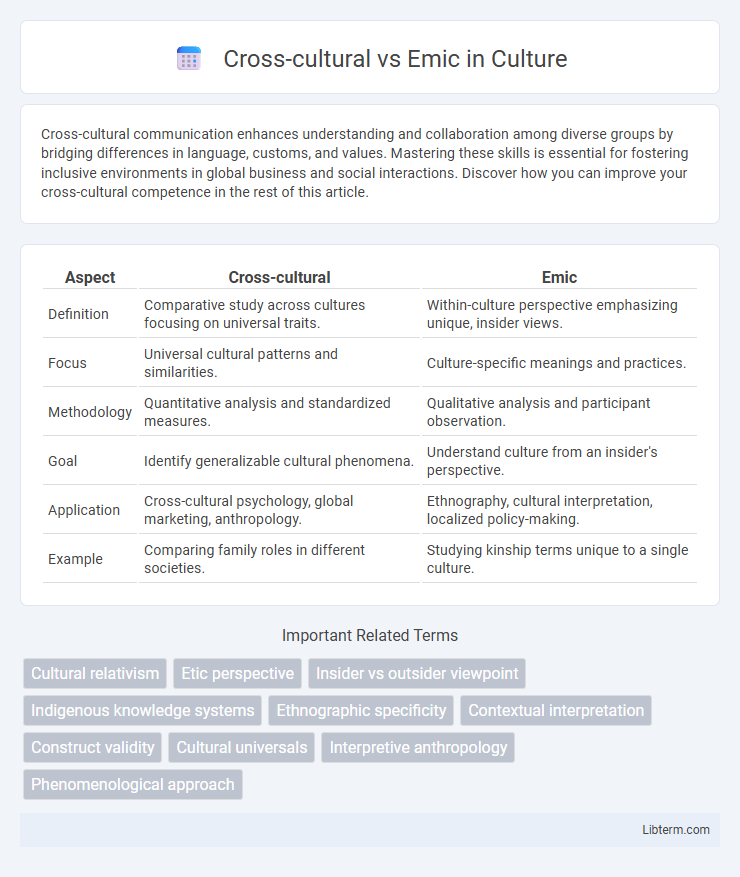Cross-cultural communication enhances understanding and collaboration among diverse groups by bridging differences in language, customs, and values. Mastering these skills is essential for fostering inclusive environments in global business and social interactions. Discover how you can improve your cross-cultural competence in the rest of this article.
Table of Comparison
| Aspect | Cross-cultural | Emic |
|---|---|---|
| Definition | Comparative study across cultures focusing on universal traits. | Within-culture perspective emphasizing unique, insider views. |
| Focus | Universal cultural patterns and similarities. | Culture-specific meanings and practices. |
| Methodology | Quantitative analysis and standardized measures. | Qualitative analysis and participant observation. |
| Goal | Identify generalizable cultural phenomena. | Understand culture from an insider's perspective. |
| Application | Cross-cultural psychology, global marketing, anthropology. | Ethnography, cultural interpretation, localized policy-making. |
| Example | Comparing family roles in different societies. | Studying kinship terms unique to a single culture. |
Introduction to Cross-Cultural and Emic Approaches
Cross-cultural and emic approaches offer distinct perspectives in cultural research, with the cross-cultural method emphasizing comparative analysis across multiple cultures to identify universal patterns and variations. The emic approach prioritizes understanding behaviors, beliefs, and customs from within the specific cultural context, providing deep insights into indigenous meanings and practices. Employing both approaches enriches cultural studies by balancing generalizability with insider viewpoints, thereby enhancing the accuracy and relevance of anthropological and sociological findings.
Defining Cross-Cultural Research
Cross-cultural research systematically compares cultural groups to identify universal behaviors and cultural variations, emphasizing external validity across diverse populations. It involves replicating studies in multiple cultures to test hypotheses about human behavior rooted in cultural contexts. This approach contrasts with emic research, which focuses on in-depth understanding of behaviors within a single culture through native perspectives and meanings.
Understanding the Emic Perspective
Understanding the emic perspective involves analyzing cultural phenomena from within the social group, emphasizing insiders' viewpoints and meanings. This approach prioritizes subjective experiences, customs, and linguistic nuances unique to the culture being studied, which contrasts with the broader, comparative nature of cross-cultural analysis. Emic research deepens cultural empathy and helps in constructing theories grounded in authentic cultural contexts rather than external interpretations.
Key Differences Between Cross-Cultural and Emic Approaches
Cross-cultural research compares cultural phenomena across multiple societies to identify universal patterns, emphasizing external observations and broad generalizations. The emic approach centers on understanding behaviors and beliefs from within a specific culture, prioritizing subjective meanings and insider perspectives. Key differences lie in methodology and focus: cross-cultural studies seek cross-societal comparisons using standardized frameworks, while emic research delves deeply into unique, culture-specific contexts.
Methodologies in Cross-Cultural vs Emic Studies
Cross-cultural methodologies emphasize comparative analysis across diverse cultures using standardized measurement tools to identify universal patterns in human behavior. Emic approaches prioritize insider perspectives, employing qualitative methods such as participant observation and ethnographic interviews to capture culture-specific meanings and context-dependent phenomena. The distinct methodologies reflect a tension between generalizability and cultural specificity, with cross-cultural research favoring replicable metrics and emic studies focusing on nuanced, context-rich data.
Advantages of Cross-Cultural Analysis
Cross-cultural analysis enables researchers to identify universal patterns and cultural variations by comparing multiple societies, enhancing the generalizability of findings beyond single-group studies. It provides a broader perspective that helps to uncover underlying cultural dynamics and avoid ethnocentric biases inherent in emic approaches. This method supports the development of more robust, culturally sensitive theories applicable across diverse populations.
Benefits of Emic Research
Emic research provides deep insights into cultural-specific behaviors, beliefs, and values by prioritizing the insider's perspective, which enhances the accuracy and relevance of data within a particular cultural context. This approach allows for the discovery of unique cultural phenomena that might be overlooked in cross-cultural studies, thus fostering more culturally sensitive and effective interventions, policies, or products. Emic methodologies improve the validity of qualitative data by reflecting authentic local meanings and reducing ethnocentric bias in social science research.
Challenges in Cross-Cultural and Emic Comparison
Cross-cultural research faces challenges such as cultural bias, language barriers, and difficulties in ensuring equivalent measures across cultures. Emic comparison struggles with interpreting culture-specific nuances without imposing external perspectives, which can lead to misrepresentation of indigenous meanings. Both approaches require careful methodological design to avoid ethnocentrism and to maintain validity in comparing psychological constructs across diverse cultural contexts.
Applications in Psychology and Anthropology
Cross-cultural research in psychology and anthropology compares behaviors and norms across diverse societies to identify universal patterns, while emic approaches focus on understanding cultural phenomena from within the specific cultural context. Cross-cultural methods facilitate the development of generalized theories applicable to multiple cultures, aiding in global mental health assessments and intercultural competence training. Emic studies provide deep insights into unique cultural practices and belief systems, crucial for culturally sensitive interventions and preserving indigenous knowledge.
Implications for Global Research and Practice
Cross-cultural research examines universal behaviors across diverse cultures, emphasizing comparability and generalizability, while emic approaches focus on culture-specific perspectives and meanings unique to individual groups. The choice between these methodologies significantly impacts global research and practice by shaping data interpretation, intervention design, and policy development tailored to cultural contexts. Understanding this distinction enhances the effectiveness of multinational studies, cross-cultural communication, and culturally sensitive applications in fields like psychology, marketing, and healthcare.
Cross-cultural Infographic

 libterm.com
libterm.com